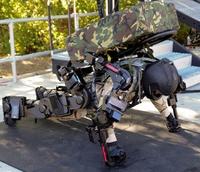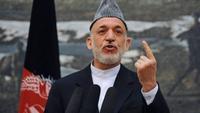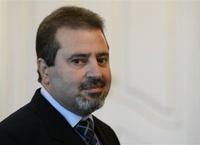-
Preoccupation with bioterrorism hobbles preparations for natural spread of deadly viruses
Preoccupation with hypothetical bioterrorism attacks is leaving America more vulnerable to the threat of natural spread of deadly viruses. Since the 9/11 attacks, the federal government has poured billions of dollars to prevent and monitor threats of bioterrorism, yet the United States was ill-prepared for the swine flu outbreak of 2009. Experts say it is time to rebalance public health priorities so that preparations for the real threat of the outbreak of infectious diseases will not take a back seat to preparations for the more remote threat of bioterrorism.
-
-
Military technology outpaces laws of war

Today’s emerging military technologies — including unmanned aerial vehicles, directed-energy weapons, lethal autonomous robots, and cyber weapons like Stuxnet — raise the prospect of upheavals in military practices so fundamental that they challenge long-established laws of war. Weapons that make their own decisions about targeting and killing humans, for example, have ethical and legal implications obvious and frightening enough to have entered popular culture (for example, in the Terminator films). The current international laws of war were developed over many centuries and long before the current era of fast-paced technological change.
-
-
U.S. concerned about Karzai’s plan to release dozens of militants

Just a few months after American officials transferred control of all detention operations in Afghanistan to Afghan forces, President Hamid Karzai’s administration has decided to release dozens of prisoners, despite objection from American and Afghan officials.
-
-
Central African Republic, already mired in ethnic violence, faces another threat: famine

Since last year, when they had to flee the intensifying violence across the Central African Republic, farming communities had to abandon their fields along the main roads to replant deep in the bush. This disruption led them to produce much less than in previous years, with a major impact on their food reserves, which will last till February instead of July. The success of the next planting season crucially hinges on the return of farming families to the fields. Families who are unable to plant in March will have to wait one whole year before they can hope to harvest again. Failure to plant in March will have dire consequences for the food security of the Central African Republic’s population.
-
-
Volgograd train station bombing highlights need for more rail security

The recent train station bombing in Volgograd, Russia has focused attention on the vulnerabilities of rail infrastructure. According to a recently published report by IHS, purchases of explosives, weapons, and contraband (EWC) detection equipment at rail stations worldwide is expected to increase by 3.3 percent in 2014, and 8.8 percent in 2015.
-
-
Nations' nuclear ambitions not discouraged by few suppliers
Twenty-nine countries are considering constructing their first nuclear power plant. There are doubts as to which of these nuclear “newcomer” countries can actually succeed and join the thirty-one countries that already operate nuclear reactors. If even half of the national plans for nuclear power plants materialize, the geography of nuclear energy would radically change and could revitalize a stagnant industry. But given the obstacles to starting a national nuclear power program even for rich and stable countries, it’s not likely to happen quickly elsewhere.
-
-
Beirut car bomb exposes Hezbollah’s weakening position in Lebanon
In yet another sign of Hezbollah’s weakening position in Lebanon, a powerful car bomb exploded yesterday near the organization’s political headquarters in the Haret Hreik district of the suburb of Dahiyeh, the well-guarded Shi’a section in southern Beirut. The attack, which killed five and injured dozens, is the fifth such attack since July. Analysts say that the May decision by Hezbollah to send thousands of its fighters to Syria to fight against the Syrian rebels in order to save the Assad regime fatally undermined Hezbollah in Lebanon, proving its critics’ claims that Hezbollah was not much more than an instrument of Iran’s foreign policy, and that it was more loyal to its Shi’a identity than Lebanese interests. Hezbollah’s decision emboldened its Lebanese opponents, and convinced Saudi Arabia to throw its considerable weight behind the Lebanese forces determined to take Hezbollah down.
-
-
Canada designates Boko Haram a terrorist organization

Canada, under its Criminal Code, has designated Boko Haram as a terrorist organization. The United States did so three weeks ago. The Canadian government also listed the Caucasus Emirate, a Dagestan-based Islamist group, as a terrorist organization. The group is blamed for the recent bombings in Volgograd.
-
-
U.S. global share of biomedical research spending declines

The U.S. global share of biomedical research spending fell from 51 percent in 2007 to 45 percent in 2012, while Japan and China saw dramatic increases in research spending. The research and development spending in the United States dropped from $131 billion to $119 billion, when adjusted for inflation, from 2007 to 2012, while Japan increased spending by $9 billion and China increased by $6.4 billion. Overall, Asia’s share of spending grew from 18 percent to 24 percent. Europe held steady at 29 percent.
-
-
Palestinian ambassador to Czech Republic killed in explosion

Jamal al-Jamal, the Palestinian ambassador to the Czech Republic, was killed yesterday in a blast at his home in Suchdol, an upscale suburb north of Prague. The blast is believed to have been caused by explosives stored in a safe. When he opened the safe, the explosives went off. Riad al-Maliki, the Palestinian foreign minister, said that the safe had not been opened in at least thirty years. The ambassador moved to the new building in October, and workers moved the safe, unopened, from the old offices of the Prague Palestinian mission to the new one at that time.
-
-
Judge upholds New York gun restrictions -- except 7-round per magazine limit

A federal judge on Tuesday ruled that New York’s strict new gun laws, including an expanded ban on assault weapons, were constitutional. He struck down, though, a provision prohibiting gun owners from loading more than seven rounds into a magazine. The 54-page ruling by William M. Skretny of Federal District Court in Buffalo should be considered a victory for gun control advocates who saw gun control measures on the federal level stall. Judge Skretny, writing that “whether regulating firearms is wise or warranted is not a judicial question; it is a political one,” said that expanded bans on assault weapons and high-capacity magazines were legally sound because they served to “further the state’s important interest in public safety.”
-
-
Volgograd under lockdown as Winter Games security worries grow
Volgograd has been placed under tight security after a Monday suicide bombing on trolleybus killed sixteen, one day after seventeen people were killed at a train station. For the Russian government, the attacks represent the worst possible scenario: an orchestrated bombing campaign during the run-up to the Winter Olympics – and during the games themselves — in a region too big, and with too many soft targets, to be secured effectively. Such a broad and well-coordinated terror campaign will overshadow – and might even seriously disrupt — the biggest international event on Russian soil since the 1980 Moscow Olympics.
-
-
FAA approves testing, developing standards for commercial use of drones
The Federal Aviation Administration(FAA) yesterday (Monday) has authorized test sites for UAVs. The FAA has selected six institutions to run the tests and operate the test sites. The test sites are part of a program to develop safety and operational rules for drones by the end of 2015, as mandated by Congress. Experts anticipate an exponential growth of drone use in the agriculture and law enforcement sectors. Analysts predict that more than 70,000 jobs would be created in the first three years after Congress approves drone use in U.S. skies, and that the global commercial drone market will reach $89 billion in the next decade.
-
-
Judge rules NSA’s collection of telephony metadata is legal
A federal judge on Friday ruled that the collection of large amounts of phone metadata by the National Security Agency (NSA) is legal. The decision by Judge William H. Pauley III in New York adds yet another legal interpretation to an increasingly contentious debate over the legality of the NSA collection programs. In just eleven days, two judges and a presidential review panel reached significantly different conclusions about key issues related to the NSA surveillance program, among them the intelligence value of the data the program collects, the privacy interests – and expectations — at stake, and the constitutionality of the program in its present form.
-
-
Telephony metadata: Matching numbers to names
Explaining why American should not be worried about the NSA collection of telephony metadata, President Obama, in a PBS interview, said: “You have my telephone number connecting with your telephone number…. [T]here are no names … in that database.” Two Stanford graduate students set out to discover just how much effort it would take to identify the names of phone number owners. Their answer: a trivial amount of effort. themselves the task out to find out. Querying the Yelp, Google Places, and Facebook directories, and running their sample numbers with Intelius, a cheap consumer-oriented service, they matched 91 percent of the sample numbers with the number owners. “If a few academic researchers can get this far this quickly, it’s difficult to believe the NSA would have any trouble identifying the overwhelming majority of American phone numbers,” they write.
-
More headlines
The long view
Factories First: Winning the Drone War Before It Starts
Wars are won by factories before they are won on the battlefield,Martin C. Feldmann writes, noting that the United States lacks the manufacturing depth for the coming drone age. Rectifying this situation “will take far more than procurement tweaks,” Feldmann writes. “It demands a national-level, wartime-scale industrial mobilization.”
No Nation Is an Island: The Dangers of Modern U.S. Isolationism
The resurgence of isolationist sentiment in American politics is understandable but misguided. While the desire to refocus on domestic renewal is justified, retreating from the world will not bring the security, prosperity, or sovereignty that its proponents promise. On the contrary, it invites instability, diminishes U.S. influence, and erodes the democratic order the U.S. helped forge.
Fragmented by Design: USAID’s Dismantling and the Future of American Foreign Aid
The Trump administration launched an aggressive restructuring of U.S. foreign aid, effectively dismantling the United States Agency for International Development (USAID). The humanitarian and geopolitical fallout of the demise of USAID includes shuttered clinics, destroyed food aid, and China’s growing influence in the global south. This new era of American soft power will determine how, and whether, the U.S. continues to lead in global development.
Water Wars: A Historic Agreement Between Mexico and US Is Ramping Up Border Tension
As climate change drives rising temperatures and changes in rainfall, Mexico and the US are in the middle of a conflict over water, putting an additional strain on their relationship. Partly due to constant droughts, Mexico has struggled to maintain its water deliveries for much of the last 25 years, deliveries to which it is obligated by a 1944 water-sharing agreement between the two countries.
How Disastrous Was the Trump-Putin Meeting?
In Alaska, Trump got played by Putin. Therefore, Steven Pifer writes, the European leaders and Zelensky have to “diplomatically offer suggestions to walk Trump back from a position that he does not appear to understand would be bad for Ukraine, bad for Europe, and bad for American interests. And they have to do so without setting off an explosion that could disrupt U.S.-Ukrainian and U.S.-European relations—all to the delight of Putin and the Kremlin.”
How Male Grievance Fuels Radicalization and Extremist Violence
Social extremism is evolving in reach and form. While traditional racial supremacy ideologies remain, contemporary movements are now often fueled by something more personal and emotionally resonant: male grievance.
